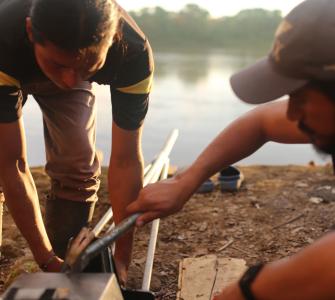Rivers are a central part of life for many, if not most, Amazonian Indigenous communities. Petrol and man-powered boats are a primary mode of transportation, enabling people to manage their territory and access markets. However, the use of fossil fuel is both expensive and results in air and water pollution.
In order to reduce the use of fossil fuels and their environmental impact, the Achuar community, who live on the Ecuador-Peru border, have worked with partners to develop the Kara Solar project. Kara Solar aims to combine technology with Indigenous knowledge to create a new transportation system for the community using solar-powered boats. A prototype was built by Kara Solar in 2017, followed by two more boats, and the preliminary results from their use has been promising.
Conservation Strategy Fund conducted an analysis to better understand how solar-powered boats compare to fuel-powered boats in terms of financial and economic costs and how transportation systems relying on solar-powered boats can reduce the pressure to build additional roads, especially in the Amazon region. To achieve this, we conducted a Life Cycle Cost (LCC) analysis, a literature review, and an Environmental Life-Cycle cost (ELCC) analysis of solar and fuel-powered boats. We then reviewed the supply chain, using a literature review and interviews, and conducted a spatial analysis and scenario analysis.
Our goal is to support Kara Solar in the promotion of this electric river transportation system as an alternative to new road construction.
This project for Kara Solar was funded by Nia Tero.
Photo credit: Kara Solar

